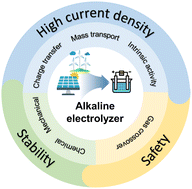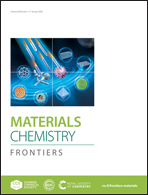Critical challenges and opportunities for the commercialization of alkaline electrolysis: high current density, stability, and safety
Abstract
Alkaline electrolysis technology, which enables the production of “green hydrogen,” holds significant importance in the global pursuit of carbon neutrality. The successful implementation and widespread adoption of this technology rely heavily on the development of efficient and durable electrocatalysts capable of operating at high current densities and ensuring safety. In recent years, there has been remarkable progress in research endeavors aimed at meeting industrial requirements, resulting in the design and synthesis of various catalysts tailored for current densities exceeding 200 mA cm−2 and possessing excellent stability. This review highlights recent advancements in the field, focusing on key factors influencing the catalytic performance in high-current-density electrocatalysis, including charge transfer, mass transport, and intrinsic activity. The mechanisms underlying catalytic degradation are discussed, and design strategies for creating highly stable electrocatalysts are presented. Furthermore, strategies for ensuring the safety of alkaline electrolysis are discussed. Finally, future directions and perspectives in this emerging field are provided, outlining potential areas of exploration and development.

- This article is part of the themed collections: 2023 Materials Chemistry Frontiers Review-type Articles and 2023 Materials Chemistry Frontiers HOT articles


 Please wait while we load your content...
Please wait while we load your content...